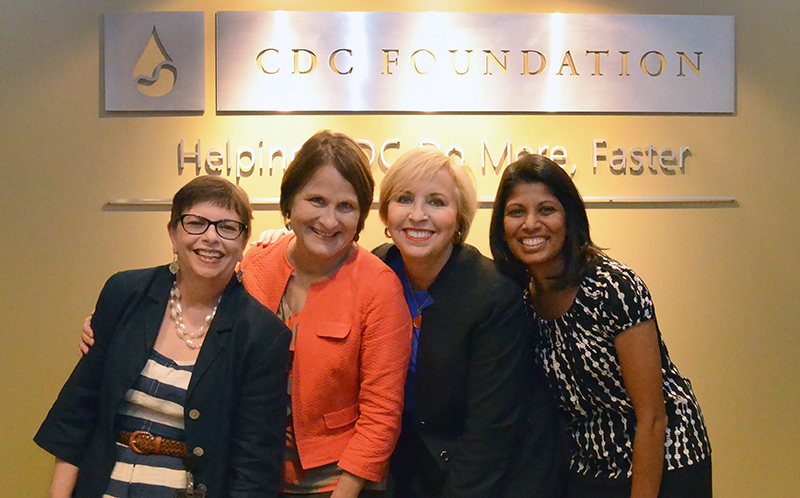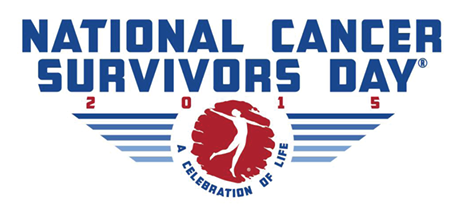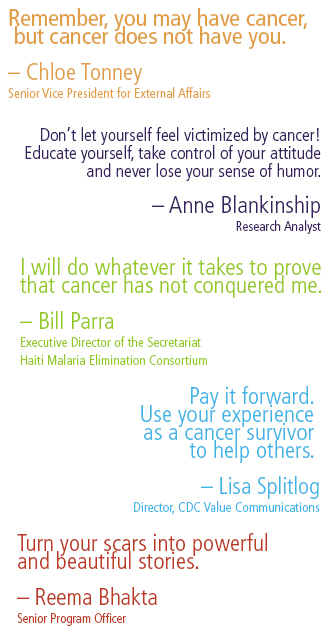You are here
Celebrating Cancer Survivorship: 5 Ways to Help a Colleague With Cancer

CDC Foundation staff Anne Blankinship, Lisa Splitlog, Chloe Tonney and Reema Bhakta (Not pictured: Bill Parra)
There are more than 14 million cancer survivors in America, and as a two-time breast cancer survivor, I’m thankful to be among them. You probably know someone who is going through cancer treatment, caring for someone with cancer, or someone celebrating survivorship. Sunday, June 7 is National Cancer Survivors Day®, a great time to reflect on life and to draw attention to the ongoing challenges of cancer survivorship.
 Inside and outside of work, people often ask me, “What can I do to help someone going through cancer?” or “What should I say or do?” Based on the thoughtful actions of my CDC Foundation colleagues—including fellow cancer survivors Chloe Tonney, Bill Parra, Reema Bhakta and Anne Blankinship—here are five simple things anyone can do to help a co-worker who is going through cancer:
Inside and outside of work, people often ask me, “What can I do to help someone going through cancer?” or “What should I say or do?” Based on the thoughtful actions of my CDC Foundation colleagues—including fellow cancer survivors Chloe Tonney, Bill Parra, Reema Bhakta and Anne Blankinship—here are five simple things anyone can do to help a co-worker who is going through cancer:
1. Offer concrete support. Instead of saying, “Let me know if there’s anything I can do,” find specific ways to help. For example, make a meal, pull together a gift basket, offer to drive someone to and from treatment, run errands or surprise a colleague with flowers.

2. Be empathetic and positive. It can feel awkward to ask someone with cancer how they’re doing, but any gesture of positive support is welcome. Thoughtful texts, emails, cards and comments let people know you care about them. Encouragement goes a long way, but try to avoid phrases like these:
- “Everything happens for a reason.”
- “Let me tell you about someone I know who died of cancer.”
- “I know how you feel.”
3. Include employees in work activities and decisions. Don’t assume that a colleague going through cancer is too fragile to handle work responsibilities, but be flexible enough to understand when they’re having a bad day. I felt reassured when colleagues conveyed that my skillset had not disappeared just because I was experiencing a major health issue.
4. Respect a colleague’s decision about how much they want to share. Everyone is different. I’m very open about my cancer journey, but a lot of people are more private about their diagnosis. Respect your colleague’s decision about what they want to share—and when they want to share it. If someone tells you about their cancer diagnosis in confidence, refrain from sharing the news with others.
5. Share your sense of humor. People who are going through difficult surgeries and treatments welcome the opportunity to laugh about something (anything!) that has nothing to do with their diagnosis.
It is inspiring and encouraging to know that on Sunday, tens of thousands of people around the world will gather in their local communities to observe the 28th annual National Cancer Survivors Day. The U.S. Centers for Disease Control and Prevention (CDC) offers a wealth of resources for cancer survivors, their families and caregivers.
According to the American Cancer Society, the number of cancer survivors is rising due in part to earlier detection and better treatments. As the number of cancer survivors continues to grow, it will be more important than ever to address survivors’ unique needs.
Hopefully these five simple tips and CDC resources will help you make a difference in the life of a cancer survivor—just as others have made a difference for me and my colleagues.
